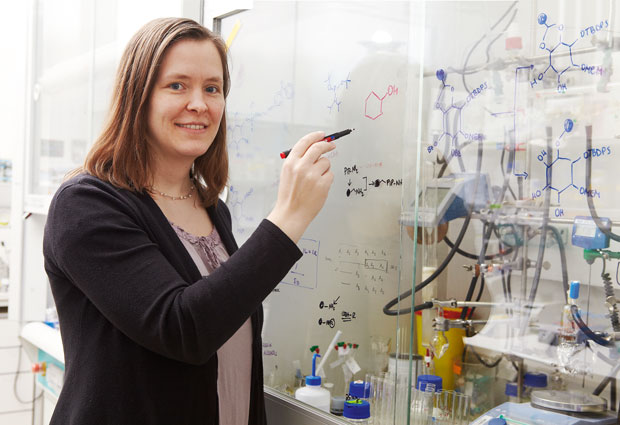
Chemical bonds
If you want to learn what life is like working on the interface of disciplines, a visit to Maja Köhn’s lab at EMBL Heidelberg would be a great place to start.

Awarded the 2015 Tetrahedron Young Investigator Award for “exceptional creativity and dedication” in the field of bioorganic and medicinal chemistry, Köhn’s work brings together chemists, molecular biologists, crystallographers, and bioinformaticians. Their common goal is to develop approaches that tease out the mysterious mechanisms of phosphatases – enzymes that have been linked to diseases such as cancer and Alzheimer’s. As part of the prize, Köhn gave an award lecture to more than 500 participants in Berlin, has another to come in Shanghai, and guest-edited a special edition of Elsevier’s Bioorganic and Medicinal Chemistry journal.
What is your Lab working on?
We combine molecular biology, biochemistry and synthetic chemistry to investigate the functions and regulation of phosphatases. One of the main tasks for chemists at EMBL is to create tools for understanding difficult-to-study proteins: if there is no inhibitor or activator present, then we can create one using chemical methods. Increasingly our work is supported by advances in crystallography, bioinformatics and microscopy, enabling us to combine a large range of tools with the goal of simulating, imaging and ultimately understanding key biological questions.
What is the dynamic like?
Chemists tend to be very analytical (every milligram counts!), while biologists are sometimes geared more towards thinking about the bigger picture rather than the molecular detail – each has to learn how the other thinks. But the rewards of doing so are huge: ultimately it leads to a very creative atmosphere in the lab.
How was the experience of guest editing a journal?
It was a fascinating insight into the ‘other side’ of the publication process. There were many challenges such as soliciting papers and selecting peer reviewers. One of the most fascinating aspects was seeing the lively, detailed and oftentimes difficult scientific discussions that take place throughout the review process. The end product includes work from groups at Hamburg, Heidelberg and Hinxton, reflecting EMBL’s broad involvement in phospho-signalling research, together with other works from colleagues and collaborators around the world. Overall, the experience was very positive, although not quite enough to lure me away from my lab in the long run!
Which philosophy do you live by?
Follow your interests, go as far into a new field or discipline as you feel comfortable with, and seek advice from other experts when reaching areas outside of your expertise or comfort zone.


